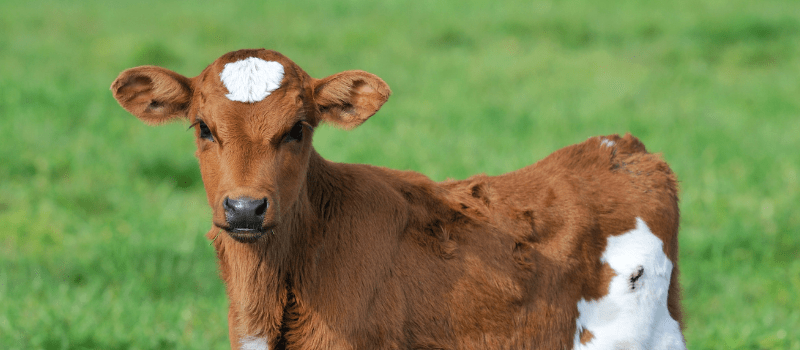#VETSVolunteerVoices brings you inspiring stories from the field, showcasing the impactful work of our dedicated VETS program volunteers. Meet Dr. Riley Bauman (DVM), an Animal Health Advisor who spent two months in Kenya (April–June 2025), working alongside smallholder dairy farmers and Meru Dairy staff to promote animal health, gender equity, and sustainable livelihoods.
Bridging Community Medicine and Food Animal Health
Even before I entered vet school, I knew I wanted to use my technical skills to work toward broader goals that connect animal, human, and environmental health. Most of my previous experiences had been with community-based care for companion animals in underserved Canadian communities. But as a recent graduate focused on livestock medicine, I was eager to explore how community medicine and food animal production intersect—especially in a global context.
That opportunity came through Veterinarians Without Borders' (VWB's) VETS program. I had heard about Kenya’s fast-growing dairy sector—and the challenges it faces, from animal health gaps to climate instability to persistent gender inequities. I wanted to learn from smallholder farmers on the ground, to see how women contribute to these systems, and to understand what kinds of support can lead to long-term change.
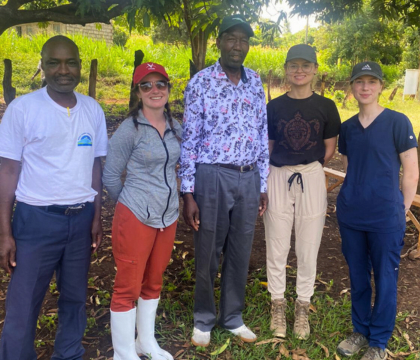 PHOTO: Riley (red cap) with VETS partners and volunteer colleagues.
PHOTO: Riley (red cap) with VETS partners and volunteer colleagues.
 PHOTO: Riley delivering a calf health and nutrition training.
PHOTO: Riley delivering a calf health and nutrition training.
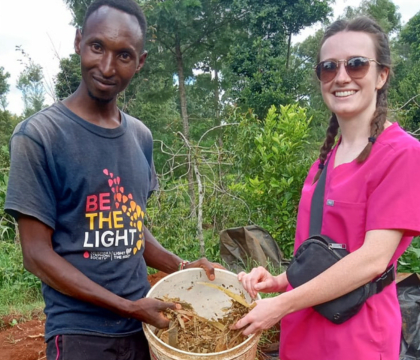 PHOTO: Riley on a farm visit to assist a young farmer in cow nutrition.
PHOTO: Riley on a farm visit to assist a young farmer in cow nutrition.
Collaborating with Farmers and Building Trust
During my placement with VWB’s local partner, Meru Dairy, in Mount Kenya East, I split my time between individual farm visits and group training sessions.
On farm visits, I worked directly with smallholder producers—listening first, then offering practical strategies tailored to their unique land base, resources, and goals. Whether we were discussing housing, forage production, calf care, or labour efficiency, the focus was always on small, achievable changes that could lead to healthier animals and improved household income.
In the Mukami region, for instance, I delivered a training on youngstock health, followed by a hands-on farm walk where we practiced skills like estimating calf weight, auditing facility design, and troubleshooting cow reproduction issues. These collaborative sessions helped farmers draw clear connections between early-life care and future herd performance—an especially powerful insight in a region where every litre of milk counts toward food security and family resilience.
In parallel, I led group trainings across Meru Dairy’s cooperative societies. Calf health and nutrition emerged as a recurring theme—many farmers hadn’t realized how much poor youngstock management could limit milk yields later on. I designed the sessions to be interactive and grounded: brief lessons, open dialogue, visual demonstrations, and follow-up visits to reinforce learning in real time.
It was during these visits and workshops that I built some of the most meaningful relationships of my placement—with women, men, and youth who were deeply invested in improving not only their farms, but their communities as well.
Strengthening Extension Capacity for Long-Term Impact
Beyond my work with farmers, I focused heavily on building lasting capacity within Meru Dairy’s internal team. I developed and delivered targeted training for extension officers, student interns, and the attachment team, alongside a master document of ready-to-use materials: presentations, templates, calf care benchmarking tools, and evaluation notes.
I knew I’d only be in Meru for two months. But by creating tools and relationships that Meru Dairy staff and future VWB volunteers could continue to use, I hoped to contribute to longer-term, sustainable growth.
These extension officers are the key to year-round, localized knowledge sharing. Supporting their confidence and capacity is one of the most important ways we can extend the ripple effect of this program.
Tackling Gender Barriers Through Dialogue
Gender equity was never a side topic in my placement—it was central to everything I did. Each training I led included space for reflection and discussion about who contributes what in a household, and how information is shared: Who cares for the calves? Who makes financial decisions? Who wasn’t at this training today—and why?
My goal wasn’t to change power dynamics overnight, but to start conversations that could lead to greater inclusivity and shared responsibility. Each group had its own barriers and opportunities, so we adapted as needed. Sometimes that meant adjusting the time of day for trainings. Other times, it meant reframing how we communicated the benefits of improved animal health—not just in terms of milk yields, but household economics, family nutrition, and time saved.
We also discussed the value of female leadership and peer-to-peer learning, and I was encouraged to see Meru Dairy leadership open to championing women as cooperative chairpeople and Community One Health Champions. These roles create space for women to lead as experts, not just caretakers.
I also proposed future steps that could help amplify this work—like building a structured peer mentorship program focused on women and youth. Creating formal avenues for farmers to learn from each other would multiply our impact and better align with the community-led spirit of VWB’s work.
As we continue to critically examine the legacy of colonialism, white saviourism, and extractive aid models, I believe strongly in programs that equip local farmers—not just with knowledge from the outside, but with the tools and networks to share what they already know.
A Story of Change: Jane’s Journey
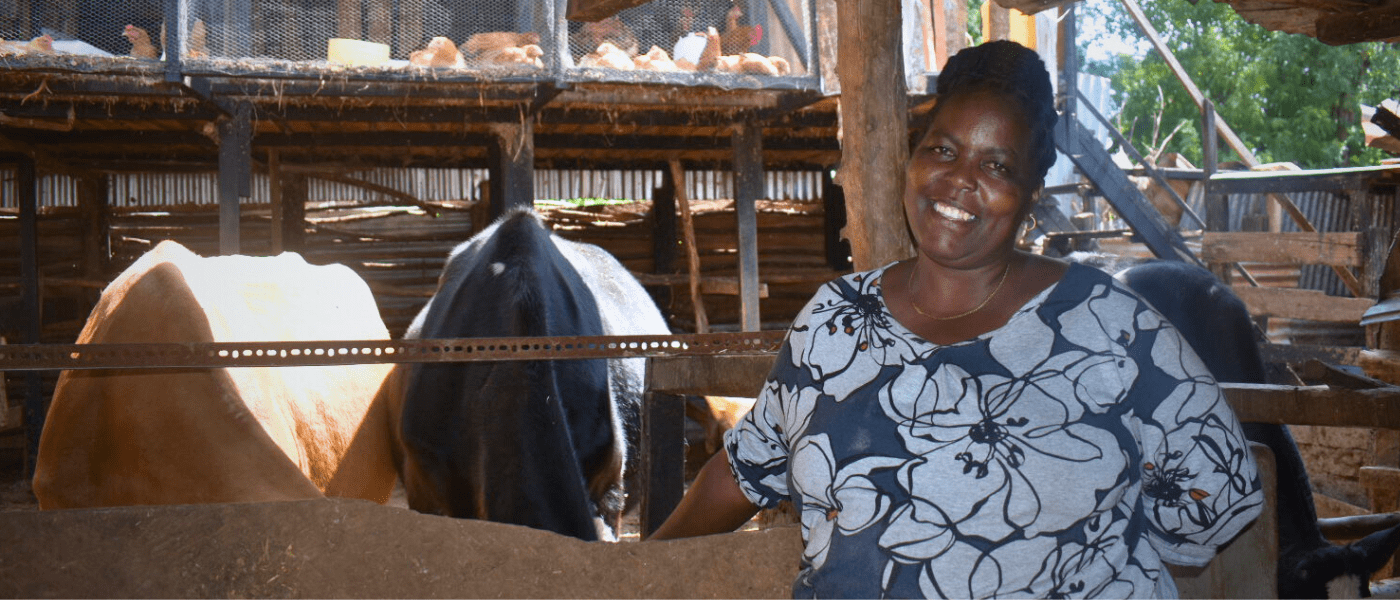 PHOTO: Jane Karambu, a model dairy farmer in Meru whose dedication and partnership with the VETS program have transformed her farm.
PHOTO: Jane Karambu, a model dairy farmer in Meru whose dedication and partnership with the VETS program have transformed her farm.
One of the most inspiring farmers I met during my placement was Jane Karambu. Jane started with one cow, limited resources, and more than her share of setbacks—purchasing poor-quality hay that led to animal loss, struggling with mastitis, and seeing her milk rejected at collection.
But over the years, through a combination of grit and ongoing support from VETS volunteers and extension officers, Jane transformed her operation. She now grows her own maize silage, napier, and lucerne on four acres and manages five milking cows and four youngstock. Her best cow produces 38 kg of milk per day.
She’s also an eager learner. In April, I recommended feeding adjustments for her young heifers and suggested switching to sand bedding for improved udder health and cow comfort. When I returned in June, she had already implemented those changes—and was excited by the results.
“No diseases, no mastitis, and happy with her calves’ growth,” she told me.
But not every farmer progresses like Jane. Some need consistent follow-up over years. Jane’s success is a reminder of what’s possible with long-term partnerships. To truly support transformation, the VETS program must remain present, responsive, and grounded in relationships.
One Health in Action
In Meru, I saw firsthand how inseparable animal health is from the broader well-being of households and communities.
Milk production isn’t just a livelihood—it’s the foundation of family nutrition, income, and opportunity. Yet the women who perform much of the daily dairy work often lack decision-making power, land ownership, or access to training. These gender gaps directly affect farm productivity and resilience. Layered on top of that is the mounting pressure of climate change: prolonged dry seasons and erratic rainfall are making it harder to grow fodder, store silage, and plan reliably.
Still, farmers are adapting. They’re diversifying forage crops, preserving feed, and improving cow comfort through better housing. In doing so—through small but strategic changes in calf care, nutrition, and reproduction—they’re building resilience from the ground up.
Take Florence Gacheri, a dairy farmer in the Mount Kenya region. In anticipation of future feed shortages, she’s expanded her acreage to plant more maize, napier, and protein-rich lucerne. Or George Muketha, a farmer in Magati society who is transitioning from Holsteins to Jerseys to improve feed efficiency and heat tolerance. These are climate-smart choices—driven not by outside prescriptions, but by farmers’ deep understanding of their land and their animals.
Improving livestock health doesn’t just boost milk yields. It supports food security, gender equity, and environmental sustainability. It’s not a siloed solution—it’s a positive feedback loop. When animals thrive, families can invest in school fees, improve their soil health, or expand their operations. One small gain enables the next.
But while farmers in Meru are doing their part, they’re navigating climate disruptions largely caused by emissions and overconsumption in wealthier countries. As international partners, our responsibility is to support—not steer—their adaptation strategies. That means listening, collaborating, and amplifying their voices on the global stage.
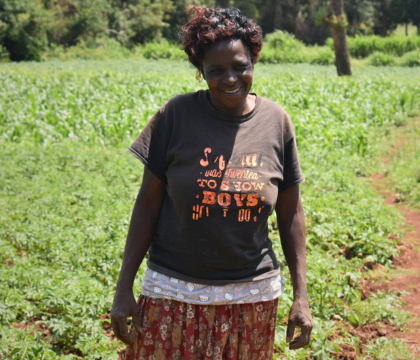 PHOTO: Florence Gacheri, dairy farmer expanding her forage acreage.
PHOTO: Florence Gacheri, dairy farmer expanding her forage acreage.
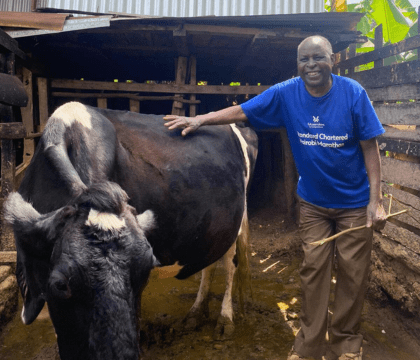 PHOTO: George Muketha, farmer moving to climate-resilient breeds.
PHOTO: George Muketha, farmer moving to climate-resilient breeds.
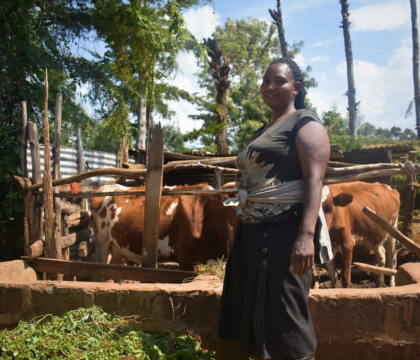 PHOTO: Sarah Karambu, dairy farmer improving her cow's production.
PHOTO: Sarah Karambu, dairy farmer improving her cow's production.
Lessons I’ll Carry Forward
Some of my most rewarding moments came from revisiting farms I had seen early in my placement. One farmer, Sarah Karambu, had been struggling with milk rejection and suspected mastitis when I first met her in April. We discussed practical, low-cost ways to improve milk hygiene, storage, and transport. By June, Sarah was proud to report her milk was being accepted again. Her determination and follow-through are emblematic of the grit I witnessed in so many women farmers across Meru.
To future VETS volunteers: take the time to return. Revisit the farms, follow up on your advice, and witness the changes taking root. These moments—shared progress, mutual trust, and lasting connection—are powerful reminders of what partnership looks like in practice. The relationships you build matter just as much as the knowledge you bring.
VETS is an 8-year initiative (2020-2028) to improve the economic and social well-being of marginalized people, particularly women and girls, in 6 countries across Africa and Asia. In collaboration with local partners, the program is implemented through 190 Canadian volunteers on international assignment and is generously funded by Global Affairs Canada. Learn more.

